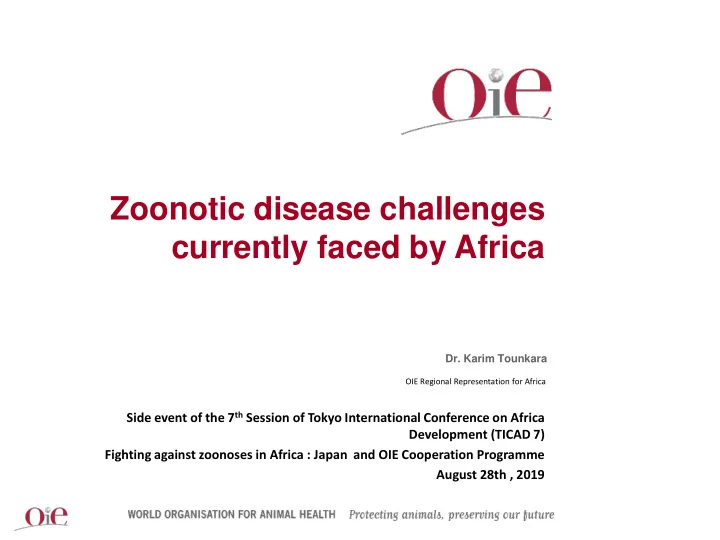

Zoonotic disease challenges currently faced by Africa Dr. Karim Tounkara OIE Regional Representation for Africa Side event of the 7 th Session of Tokyo International Conference on Africa Development (TICAD 7) Fighting against zoonoses in Africa : Japan and OIE Cooperation Programme August 28th , 2019
Zoonoses situation - 60% of existing human infectious diseases are zoonotic - At least 75% of emerging human infectious diseases pathogens (Ebola, HIV and influenza) are animal origin - 80% of pathogens with potential use for bioterrorism (anthrax, brucellosis, Q Fever etc) are zoonotic - 5 new human diseases are occurring every year out of which 3 are from animal origin ………………………. - Emerging and re-emerging diseases at the human-animal- ecosystems interface are occurring with increased frequency in Africa. At least 55 registered disease outbreaks occurred in Africa over the last decade.
Most reported zoonotic diseases in animals : 2016 - 2019 Rift Valley fever Brucellosis (Brucella… Brucellosis (Brucella melitensis) Bovine tuberculosis Anthrax Trypanosomosis Brucellosis (Brucella abortus) Rabies 0% 20% 40% 60% 80% 100% World Organisation for Animal Health · Protecting animals, Preserving our future | 3
Most reported zoonotic diseases in humans : 2016 - 2019 Trypanosomosis (sleeping… Trypanosomosis (sleeping sickness) Leishmaniosis Echinococcosis Anthrax Bovine tuberculosis Brucellosis Rabies 0% 20% 40% 60% 80% World Organisation for Animal Health · Protecting animals, Preserving our future | 4
Impact of Zoonotic diseases (1) EBOLA: - Devastating to the fragile social and economic situation. - WB: Forgone output for Guinea, Liberia and Sierra Leone due to EVD reached US$1.6 billion. - School closure for at least 6 months and the death of at least 11,000 people and 16,600 children without both parents. - Loss in Gross Domestic Product (GDP) for the 15 countries in the ECOWAS region: US$1.8 billion in 2014, US$3.4 billion in 2015 and US$4.7 billion in 2016.
Impact of Zoonotic diseases (2) RABIES - East Africa: Without dog vaccination, over a 10 years period, there would be a total of approximately 3,000 human deaths due to rabies. - In Algeria, Morocco and Tunisia the prevention of human rabies costs US$ 13.5 million annually, while the total cost of animal rabies was estimated to be US$ 3.6 million. FOODBORNE DISEASES - > 600 million people fall ill and 420 000 die every year as a result of foodborne diseases such as Salmonellosis, Botulism etc
Challenges Main constraints: - Systemic weaknesses within animal and human health sectors that hinder effective disease surveillance, early detection and rapid response. - Inadequate allocated resources to livestock sector: 1.44 % to 2.4 % of the national budget (survey undertaken by the RRA in 2017 in 37 countries)
Addressing the challenges (1) - Harmonized approach to disease surveillance and response, - Regional cooperation among veterinary services. - Joint capacity building with WHO: Joint External Evaluation Missions and National Performance of Vet. Services – Intern. Health Regulation (PSV-IHR) Bridging workshops. - OIE projects in Africa member countries: ✓ Regional Disease Surveillance Systems Enhancement project (REDISSE) funded by the World Bank. ✓ Strengthening the capacities and the surveillance for the Ebola Virus Disease project (EBO-SURSY) funded by the European Union
Addressing the challenges (2) ✓ Strengthening Veterinary Services in Developing Countries (SVSDC) and Rabies Pilot Project funded by EU. ✓ Support for Namibia in Eliminating Rabies in Dogs. ✓ Strengthening countries capacity: twinning ➢ Ecole VetAgro Sup Lyon France and Dakar Veterinary School (EISVM) ➢ Vet. Lab Guinea and ANSES (Agence nationale de Sécurité Sanitaire de l'alimentation, de l'environnement et du travail (ANSES) France on Brucellosis ➢ Central Vet Lab Mali and CIRAD France on Rift Valley Fever
Addressing the challenges (2) All OIE projects are supported by regional cooperation initiatives: Mediterranean Animal Health Network (REMESA); “One Health” Regional Coordination Platforms and the Africa Regional (OIE/WHO/FAO) Tripartite Secretariat.
Thank you for your attention 11
Recommend
More recommend